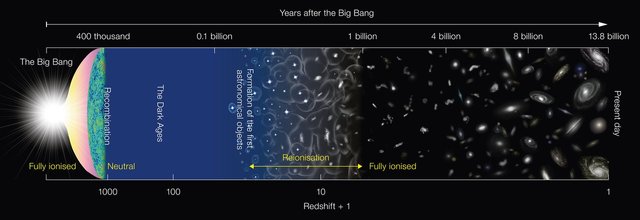The Spectrum of Time
Theories of the age of the universe have a wide range of claims.
Most scientists throughout the 19th century and the early decades of the 20th century believed the universe was eternal, having no beginning or end. Even Einstein incorporated his cosmological constant into his equations as a means for the theory to remain consistent with the Steady-State Universe model.
This is when observations in science had some extremely anomalous findings. The redshift of distant galaxies led to the conclusion that these galaxies were moving away from Earth and, therefore, there was a time when everything was together. Ergo, it was said, there was a Big Bang.
Since then, the Big Bang model has been developed to arrive at a conclusion that the universe is 13.8 billion years old.
The Spectrum of Time
With this in mind, we can see there are two essentially polar opposite opinions of the age of the universe. One claims that there is no beginning nor end, and therefore the life of the universe is infinite. The other end of the spectrum suggests there is an end--the beginning. Regardless of when this "beginning" is, be it 13.8 billion years, 6,000 years, or any of a wide range of other numerical claims to the age of the universe, they are all essentially identical when compared to infinity.
Using Logic and Reason to Deduce the Age of the Universe
It may seem that we need to use observations as a means for determining the age of the universe. However, if we step into the process without logical understanding then our conclusions on observations lack a framework on which to build our analysis. Like a house of cards, when a wind blows it will topple over.
If we compare eternity to any of these suggested ages of the universe, and put the total of each suggestion into percentage terms (where 100% is 1), then an eternal universe is 1 and a finite universe is 0. In other words, if the universe is finite in age, all of our experiences are within no time. Yet we experience the passing of time, and therefore recognize some time to exist. Is "some" part of "all" or part of "none"?
Another way to look at it is to recognize that the universe does not care how many times the Earth has gone around the sun. It does not care how many hours are in a day, how many minutes in an hour, how many seconds in a minute. A second can be divided into smaller segments, over and over and over and over and over and over again. It can be divided into so many small portions that the amount of time segments passing in one second approaches infinity.
So, "infinity" after "infinity" passes with each second, ticking away, for all of...13.8 billion years? Just because we have interpreted an observation to indicate such?
That better be one hell of an observation. How indisputable is the entire crux of why we'd believe this limited, essentially arbitrary time frame? It better be completely and utterly flawless to make such bold claims as exact finiteness. Well, is it?
Redshift can be caused by motion, sure. This is true. But here's the thing. Motion is not the only cause of redshift. Gravitational redshift is also a known mechanism for producing redshift. We have no way of differentiating one from the other in the observation itself. The redshift does not care what is causing it; it is just a redshift. Regardless of the cause, the same effect is seen...redshift. Differentiation only comes through interpretation. Ergo, the entire claim rests on an assumption.
The assumption that motion is causing the observation to begin with leads to calculations of recessional velocities which leads to back-calculations of amount of time for everything to be back together which leads to a finite age of 13.8 billion years. This entire process that arrives at an arbitrary finite age of the cosmos hinges on an assumption as the first step.
Why would science stick with an assumption that concludes such ridiculous, random, and extravagant results? Because it did not build a framework of logic and reason to recognize how illegitimate and baseless a finite universe argument is.
"Science without religion is lame, religion without science is blind."-Albert Einstein
Religion without science is not the only thing that is blind. Science without logic is blind. Science cannot dictate what is logical and reasonable; only logic and reason can. Without these things, science can conclude anything and everything, but that does not make it so. With these things, in their purest and most crystallized forms, it can conclude only one thing: the truth.
The Truth
The truth is that it is not even a question: the universe is eternal.



eternal vs. limited
true vs. false
good vs. evil
or one day you will find out anti gravitational force which will balance the interference of gravitational red shift